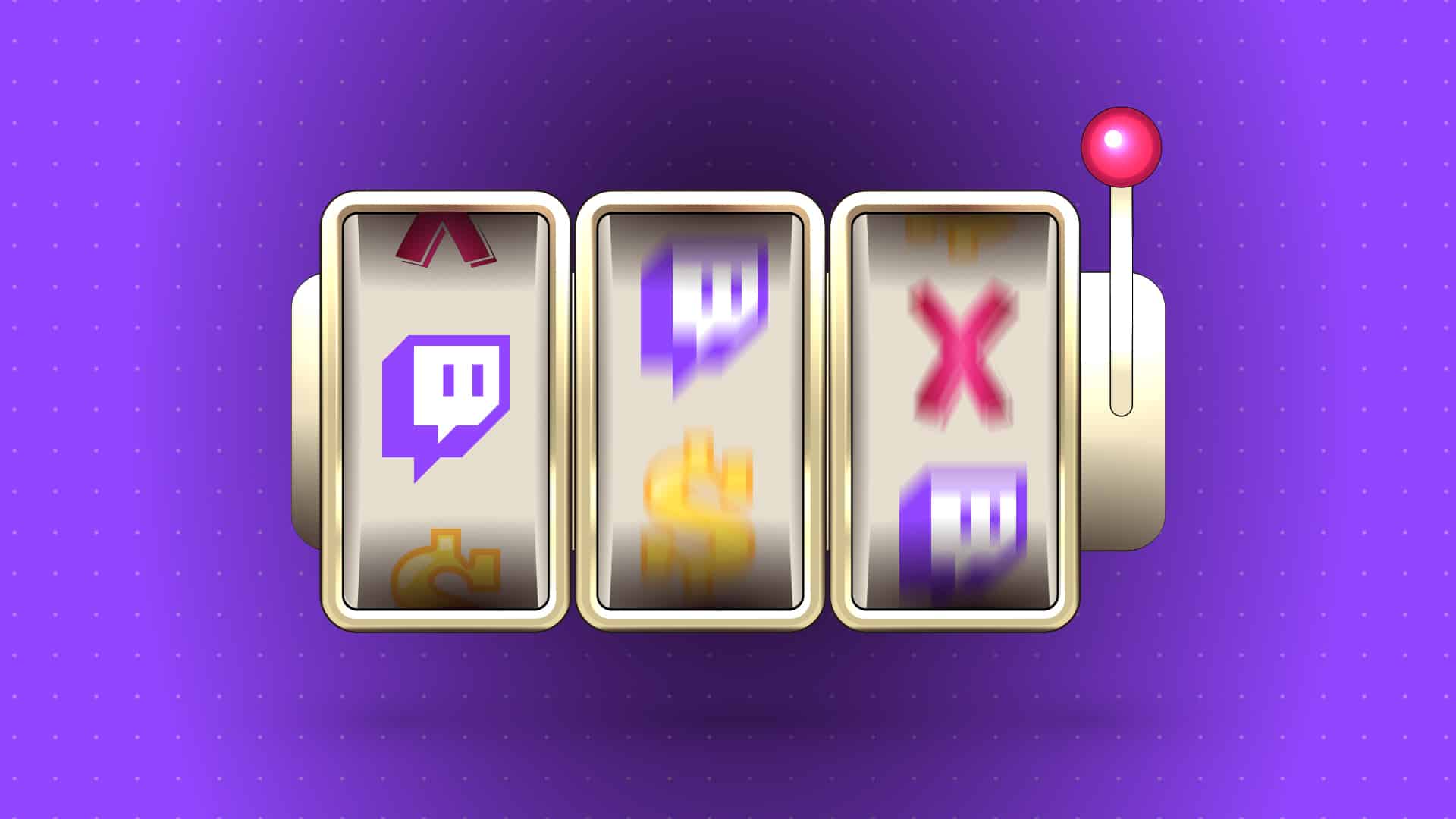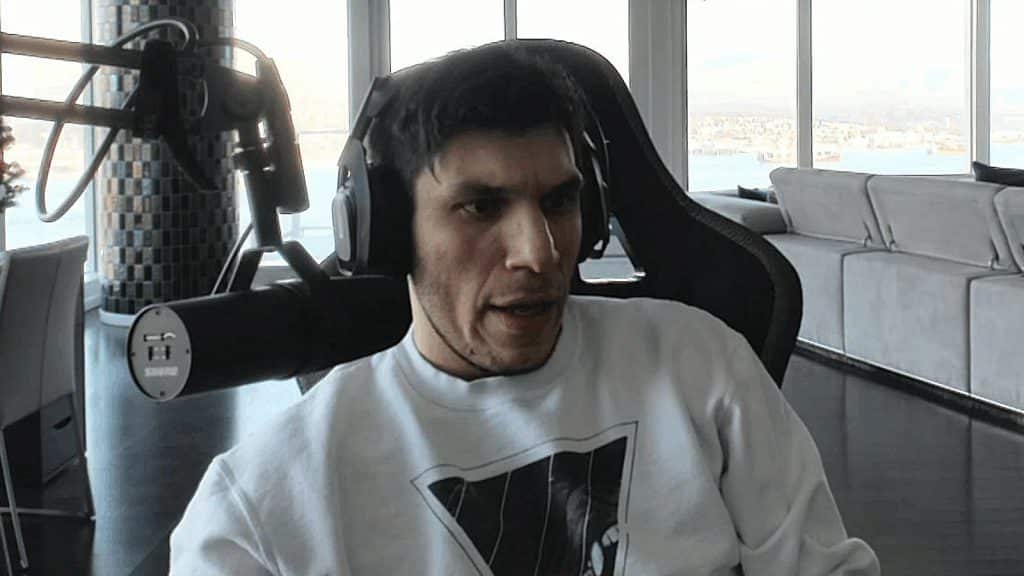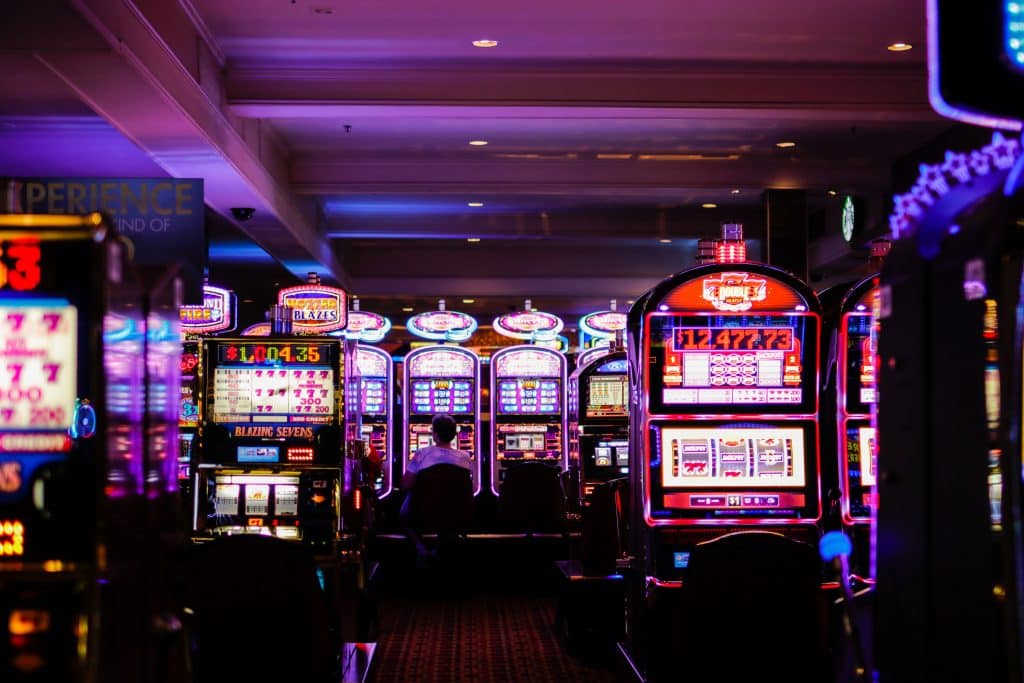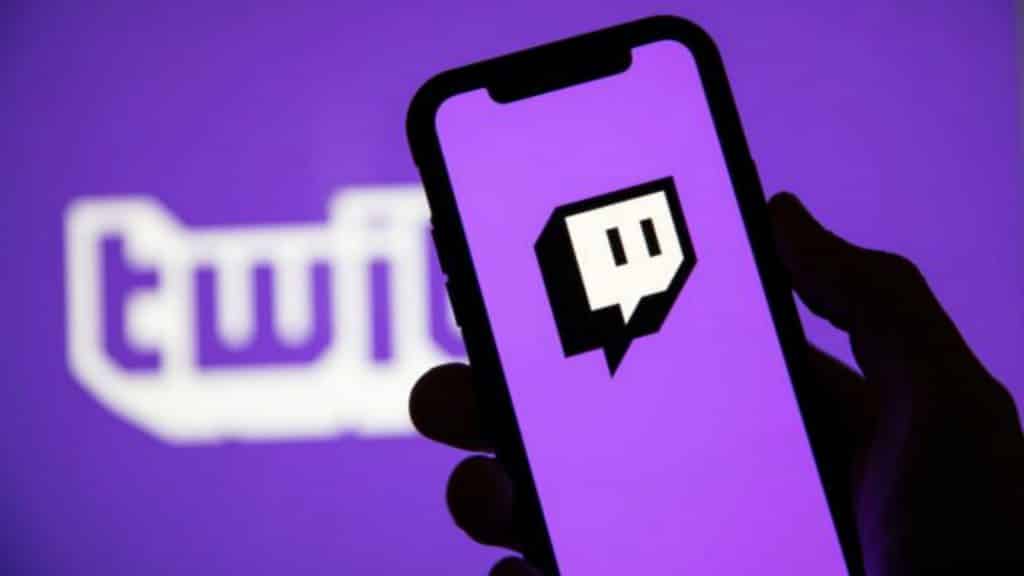The risks behind addictive Slots streams taking Twitch by storm
 Twitch / Dexerto
Twitch / DexertoSlots streams have taken over Twitch since the middle of 2021. It has quickly risen to become one of the biggest categories on the platform with millions of viewers each month. However experts are sounding alarms about its potential dangers.
On March 11, Tyler ‘Trainwreck’ Nikram was streaming Slots on Twitch to more than 50,000 viewers when he finally hit the jackpot of his life. Playing on Stake, a popular crypto gambling website, he managed to turn a $1,500 roll into $14 million in just 20 seconds.
As the numbers soared past the thousands and into the millions, he was pumping his fists. It’s a staggering amount of money even for one of Twitch’s biggest streamers, who has more than 2 million followers. His chat was just a wave of emotes as they cheered on the streamer’s win — and tried to get in on a giveaway of some of the cash that followed shortly after. The broadcast quickly skyrocketed into the hundreds of thousands of viewers with that tantalizing prospect.
“Oh my god,” he screamed. “Finally. Holy f**k. We were just talking about it. I’m shaking, bro. It just came. Just like that. Out of nowhere. I was not expecting it like that. My hands are shaking.”
However, as he celebrated the successes, Train exposed the murky underbelly of Slots gambling on Twitch. In the top right-hand corner of his stream window was a warning that says: “Do not gamble. You will lose.” The streamer quickly went on a spiel about how, despite the mega win, he was down millions in gambling losses since he took up Slots streaming back in April 2021. He was transparent in saying he was sponsored by Stake to stream Slots, and that’s how he keeps the lights on. These aren’t small sponsorships either — they can be in the millions a month, upwards of $35,000 an hour.
In his high-rise apartment in Canada though, where he can legally play on the website for upwards of 40 hours a stream, it looks like Train is living out a dream for some. Being able to just sit there, click a button, and make money regardless of the result on the screen.
As far as Slots streamers go on Twitch, Train is arguably the most ethical. He has set up mental health counseling for members of his Discord, which includes gambling help. Nikram often gives away money to those in need, not just in raffles and giveaways but even randomly based on tweets. He is open about his losses and constantly professes to his audience to not take up gambling and only watch him for the high-stakes nature. Let him take the losses, not the viewer.
In that, he is an anomaly.
Slots has quickly risen to become one of Twitch’s most popular categories. Across the first half of 2022, nearly 260 million hours of luck-based gambling content was consumed. In its rise though, Slots streams have been a hotbed of controversy and murky regulations, with Twitch more often than not being behind the 8-ball on creating rules and enforcing them.
Train is not the only big name streaming Slots. Felix ‘xQc’ Lengyel has fleeted in and out of gambling, winning hundreds of thousands on stream but losing money more often. The French-Canadian star has a massive influence on the platform, often boasting top viewership numbers every single month. They’re all being exposed to the star gambling literally hundreds of millions of dollars.
Other Just Chatting stars have given gambling a go, especially with lucrative sponsorships on the line. It has also bred its own dedicated group of streamers who reside just below the eye line of the platform’s major stars. They still pull in thousands of viewers, gambling millions of dollars a day, with much less emphasis on healthy gambling than Train.
 Twitch: TrainwrecksTV
Twitch: TrainwrecksTVIt wasn’t always this way though. Mark Johnson is an Associate Professor at the University of Sydney who has studied Twitch for the last eight years. He was also once an avid poker player and has watched the rise of gambling — both luck and skill-based — on the platform.
“Poker took off on Twitch before Slots did, but never reached the size Slots did,” he told Dexerto. “Poker started really in 2014 and Twitch chose [it] as the trial gambling game because there’s a skill aspect of course.”
Poker is still decently popular on the platform to this day. As a category, it pulls in around 4.5 to 6 million hours watched every month. However, there is a key difference between Poker and Slots. Poker is what experts call skill-based gambling. While there’s an element of luck in getting that big hand, the best players know how the system works and ultimately mind games will dictate the winner, not just chance. In Slots though, there’s no such skill. You pull a lever, the pictures line up, and you win money.
This simplicity has allowed Slots to thrive on Twitch in a way other forms of gambling couldn’t. There’s big money involved, it’s easy to understand, and that cocktail makes for a high-octane viewing experience.
“On one level it’s amazing to watch someone with $10 million in lifetime winnings playing Poker live on Twitch, but they will be talking about the game at such a high level it excludes a lot of viewers,” Johnson continued.
“By contrast, Slots has neither of those issues. There’s no skill of course, and you don’t need any specialist knowledge. Some sites have complex bonus systems and minigames, but in general, if you are an adult human or a teenager and you exist on Earth, you probably know how Slots work.”
Slots is a very broad field. Most of the gambling streams on Twitch are for real money, with streamers using crypto gambling sites like Stake and Roobet. Some are partnered with these platforms, offering sign-up bonuses and codes despite Twitch’s statement in 2021 outlawing the direct promotion of these. Streamers get around that rule by advertising them away from Twitch, usually just a quick click away from their bio onto another website.
There are also Slots online that don’t involve real money — social casino games is the official terminology. Before crypto rolled around, this was the predominant way you could gamble online. You couldn’t win any money, but you could pump money in to get more spins, or play ‘higher stakes’. This is something Alex Russell, an Associate Professor at CQUniversity, has studied extensively.
He does point out social casino games pose some risk — especially given it’s a one-way street with money in, nothing out. However, the risk isn’t comparable to other widely-criticized game mechanics like loot boxes.
“Loot boxes are a normal component of a video game and it doesn’t really feel like gambling to people. There’s not a spinning wheel, but you don’t know what is in those. Everyone knows there’s chance involved, but it’s not gambling,” he explained. “Playing a social casino game, you can win credits in the game but you can’t cash out. They look a lot more like gambling.
“People play loot boxes because they get something out of it in a game that’s relevant to them. That’s a lower barrier to entry. You have to be interested in gambling to play a social casino game though. The people who are interested in those games are exposed to it already and likely to lose a lot of money as it is.
“When you have influencers opening 100 loot boxes, [sometimes] they’ve been given it by the game and that’s not made very clear. People just assume they can do the same thing and buy 100 loot boxes but they’re bloody expensive. They’re glamorizing the wins, don’t write off the losses, and they don’t disclose the odds. On the [slots] they do that, but they don’t have any disclosures on loot boxes. They get all the benefits of gambling from a business perspective, making a ton of money and flashing lights when you win, but they don’t have to have the consumer protection or payouts.”
This sentiment is echoed somewhat by Johnson, who pointed out the risks to younger audiences: “Lootboxes in games have far greater risk to young people because they are things teens and kids can buy and play with far more than online Slots. There’s some risk, but in the grand scheme of risky things in games right now — [slots streamers are] not at the bottom, but they’re not at the top. They’re middling somewhere.”
However, influencers do throw a spanner in the works, especially for audiences of legal gambling age.
“We’re influenced by those around us,” Russell said. “We either see people doing it and we’re like, ‘that’s fun’, or it’s the people we like hanging out with. If you like drinking, you’re going to hang out with people who drink. Your social network is shaped by your interest, and they can also shape it. If I’m hanging out with someone because they like a drink and they tell me to try this gambling thing, then I’ll probably give it a go.
“Social influence is a big thing, we have an innate desire to fit in, so it’s not too surprising. They make a lot of money for a reason and peer pressure is a big thing. It depends on whether you value the opinion of your peers and parents as well.”
 Twitch: xQc
Twitch: xQcThe ‘parasocial’ nature of the influencer relationship, and how that affects viewers of Slots streams, isn’t well understood yet.
“It’s one thing to see a superstar Poker player who you will never meet playing on the World Series of Poker,” Johnson added. “It’s something else to see someone else whose bedroom you see every day, maybe you know what their girlfriend or boyfriend’s name is, and you’ve seen their dog on stream, and you’ve seen them do cooking streams and you’ve met them at TwitchCon — it’s not the same thing when this is someone who the viewer, rightly or wrongly, perceives as being in some degree of a personal relationship with.
“Twitch further complicates it because successful or aspirational streamers do a lot of stuff to keep viewers engaged and encourage viewers to play games with them. The streamer encouraging the viewers to some extent into the kind of games, communities, and types of play they engage in is pretty normal.
“That’s one thing if you play World of Warcraft, it’s something quite different when you play Slots for an immense amount of money and you have a code that lets you sign up to a site and get a bonus.”
The streamers are one thing, but Twitch itself as a platform is another consideration. Twitch themselves aren’t hosting the gambling sites. All they’re doing is allowing live streamers to broadcast themselves using these gambling sites. The regulations around this, depending on where you live, are murky according to Brett Abarbanel, the Director of Research at the International Gaming Institute.
“In general, Twitch doesn’t fall under any gambling regulation. They don’t operate a gambling operation,” Abarbanel said. “However, they do in some cases, and in some jurisdictions, this has come up — they might fall underneath advertising standards because they are presenting the gambling activity in a way that is generating income.
“One of the things Twitch requires within their Terms of Service is basically you can’t stream anything that’s illegal where you are. It’s a pretty standard thing. That can cause different questions and issues. The underlying gambling activity could be illegal depending on the license status of the site they’re using, and also the geolocation of the streamer.”
Combine all of this with the fact that online gambling itself is still a relatively new space, and it’s a total mess. Where the responsibility lies isn’t clear and it’s only getting murkier.
“If the gambling site is in Canada, and the streamer is in Brazil, and the viewers are all over the world — which laws apply? Local laws? National laws? International laws? When you compound this with the vast variety of currencies that are available, especially with crypto, it gets very complex very quickly.”
Dexerto has spoken to multiple individuals who have been influenced by Twitch streamers to gamble themselves. Some only tried it once or twice before pulling out. A number were consumed by chasing the high of a win, egged on by seeing their favorite streamer hit a jackpot. Those who had previously gambled in person were especially vulnerable to these Slots streamers and online gambling after lockdowns forced people inside and casinos were closed down.
“I stumbled upon streamers such as Trainwrecks as well as other content creators such as Prodigy or WatchGamesTV and it created this idea in my mind that you would always win due to their videos being all wins and created a false sense of security that I would make money,” one player, who asked to remain anonymous, told Dexerto.
They had previously gambled on real-world slot machines, but moved to different platforms so as to emulate their favorite streamers.
“I decided to try, first in locally-allowed casinos [outside of the United States], and eventually got bored and moved to using a VPN and gaining access to Stake, the main site that most of these streamers and creators use as it has the ‘popular slots’.”
“I luckily have a strong circle of friends who care as well as being of an age to realize what I was doing was a waste of money and ruining things for me, but there was a point in time where I wasn’t working due to the pandemic and using whatever money I could scrap together to have a go at slots.”
 Unsplash: Benoit Dare
Unsplash: Benoit DareThis same individual noted many streamers did not place an emphasis on healthy gambling behaviors. While Train was “probably the best in that every time he had a win he would play a clip of him explaining why you shouldn’t gamble”, other streamers don’t have similar disclaimers. In fact, there’s somewhat of a sense of ‘hype’ or toxic positivity in these circles that feeds streamers and viewers to continue gambling with higher stakes without any attention drawn on the risks.
“When you look at other creators [of Train’s] size, ROSHTEIN in particular, they have a rich lifestyle. Train seems to keep it real to an extent and is honest about all of it… which helps with deterrence,” they said.
Ishmael ‘ROSHTEIN’ Swartz, a Swedish streamer, is one of the pioneers in Twitch’s Slots section with more than 1 million followers. He is one of the platform’s most watched streamers, too, with thousands tuning in every day. His stream bio states he is “streaming slots every day with the most positive community… here to entertain you at no cost”. While he boasts a lavish lifestyle on Twitch and other social media, he doesn’t go to the same lengths in terms of promoting healthy gambling. There’s a disclaimer at the start of his streams, a little button far down the page, and sometimes he brings it up. But it gives the impression anyone can win big on these sites if they funnel in enough money.
This viewer’s story is not unique, and while they were older than 18, a proportion of the Slots audience on Twitch isn’t, largely due to the weak age-gating on the platform. While gambling sites are more strict with these checks, loopholes do exist. One of the bigger headline makers was a claim by Mizkif that an 11-year-old Adin Ross fan had approached the star streamer and told him he tried out gambling because of Ross’ influence.
“You know what he said to me? He said yeah [I’ve tried gambling]. And he said all my friends do as well,” he said on stream. “I’m like, ‘bro, what the f**k?’ And he’s like, ‘we’ve all tried it before.’ And I start telling him ‘dude, you’re never going to win money’.”
Mizkif didn’t show any evidence of this — just his anecdote — but Dexerto has spoken to individuals who have seen minors influenced by their favorite Twitch stars gamble with real money. It can be hard for parents to intervene with the online space becoming more complex.
“When kids are involved, encouragement to get involved in gambling often seems to focus on the rewards being sensationalized,” one anonymous source said. “Alternatively, or even additionally, the risks are minimalized: not everyone can throw 10 to 100 bucks at something but everyone has a dollar or two, right? What’s a buck here or there? The nickel-and-dime approach is something that the gambling and gaming industries have always leaned heavily into, especially with loot boxes, skins and such.
“It’s even more insidious when dealing with children, as they have no sense of proportion and don’t have any real-life experience with long-term consequences. They heavily encourage the ‘I want it now!’ mentality.”
It’s not just the effect on the individual either. It’s the fact these influencers can often foster a hive-minded group who follow the streamer’s beck and call.
“Influencers and communities that engage heavily in gambling or gambling-related activities can often be seen to be extremely hostile, but only if you look beyond what might otherwise be a superficially supportive community,” the same source continued.
“Anyone who doesn’t follow the norm, in regards to behavior, is ridiculed or badgered into acting similarly. Even if it’s not that blatant, peer pressure will regularly flip an otherwise reserved viewer into someone that’ll gamble just to be accepted, especially if their friends are already involved.”
While there’s plenty of emphasis on Twitch influencers streaming on a more independent level, gambling sites themselves have taken note of the platform’s power in potentially generating new users too. Stake brought on music superstar Drake in July, with his stream pulling in more than 112,000 concurrent viewers. It’s part of a partnership he has with the platform where he played a number of casino games — Slots included — as viewers chatted about how Drake is well off enough to put hundreds of thousands onto the website. The stream was reportedly done with real money on the line.
So there’s all this talk about Slots streams being a potential problem on Twitch. But where does the solution, if any, lay? Who is ultimately responsible for pushing healthy gambling practices onto viewers and to warn them of the risks associated with gambling?
There’s no straight answer.
“Gambling and risk-taking has been a part of our lives for as long as human beings have existed,” Abarbanel said. “A die, you might throw, do you know why it has little pips on it? Dice are older than the modern numbering system — that’s how long we’ve been incorporating chance into our lives.
“There’s an element of this that very much taps into human risk-taking behavior and when we tap into that, there’s a potential for harm. There’s a potential for entertainment, excitement, fun, a potential to win money, but you can’t discount the element of harm that can also take place.”
 Twitch
TwitchIt’s common for streamers to point the finger at other streamers. People like Imane ‘Pokimane’ Anys have called on fellow stars to be more responsible in what they broadcast to their impressionable audiences and also pushed Twitch for stricter protections. It’s not as simple as just blocking referral links (which the platform says it does “in order to address scams and other harms associated with questionable gaming sites,” but streamers get around it by linking to their own websites which include referral codes) or slapping even more 18+ warnings on stream though.
There are some arguments to be said about whether Slots streaming is a bad thing at all. Viewers can just watch the streamer without having to take part themselves. This is something Train emphasizes, and something that early research does point towards as being a potential coping mechanism for recovering problem gamblers.
“There’s some research which shows that people who have existing gambling issues, or those who are prone to those issues, watching gambling can give them some of that kick without themselves playing,” Johnson stated. “There could be an upside here that rather than someone going and playing slots for lots of cash themselves, they go watch xQc play Slots for high stakes. Some of that thrill is enjoyed vicariously there instead of them doing it themselves.”
However the best solution, according to the gambling experts, is one that involves all stakeholders — but especially the influencers themselves.
“I think the streamer has a lot of responsibility to disclose any relationships they have with a gambling site,” Johnson continued. “I think they have a responsibility to emphasize and make clear that playing slots is a long-term losing game. It’s a mathematical fact. They have a responsibility to emphasize that, particularly in this context where it’s such high stakes.”
“One of the really great things influencers have is their communication with viewers,” Abarbanel added. “Streamers will openly discuss things like mental health, maybe even trauma issues or physical health things. There’s an openness to the relationship between a streamer and their viewers, especially in video games, that’s not always present in a celebrity-fan relationship we see with sport. Because there’s this vulnerability between the stream and the viewer, they can reach audiences in a way that traditional efforts to provide information about responsible gambling has struggled to accomplish.”
Twitch has a lesser role: “One of the options is for Twitch to say ‘okay, we’re going to do better age-gating’ — gambling sites use them all day every day. They could put a ban on slots streams, that’s an option in the end. They hold the decision-making power for that,” Abarbanel continued.
In a statement to Dexerto, a Twitch spokesperson said the platform is constantly expanding their policies around gambling on the platform to stop “any potential harm”.
“We continuously evaluate and update our safety policies and products to ensure they protect our community while balancing streamers’ creative expression,” they said. “While gambling content represents a very small fraction of the content streamed on Twitch, we monitor it closely to ensure our approach mitigates potential harm to our global community.
“We are currently in the midst of a deep-dive look into gambling behavior on Twitch, in addition to an evaluation of the effectiveness of previous policies in this area, to determine whether there are further measures we can take that will reduce harm.”
As for gambling sites, thinking they might do anything to stop users from playing on their sites is a bit rich. And realistically, until there is some legal requirement forcing any stakeholder to take responsibility, it’s likely nothing will really change unless Twitch believes something should change.
“When we have hundreds of thousands of people watching live high-stakes gambling within the context of that intimacy on Twitch, there has to become a point where someone is going to notice,” Johnson said. “Whether they are a responsible thoughtful person or [they think] ‘oh gambling, I can get some points by coming down hard on it’ — regardless of which one it is, someone will say ‘hang on, we need to talk about this.’”
There was a universal chorus though — from gamblers and experts alike — that it doesn’t mean they shouldn’t try and be a bit more responsible.
As Abarbanel eloquently put it: “Right now, what we’re doing is normalizing gambling, but there’s so much potential to normalize healthy gambling practices by just making it a standard part of the way influencers communicate with their audience.”
Dexerto contacted a number of high-profile Slots streamers, including ROSHTEIN, for comment. They did not reply in time for publishing. Stake has also been contacted for comment.